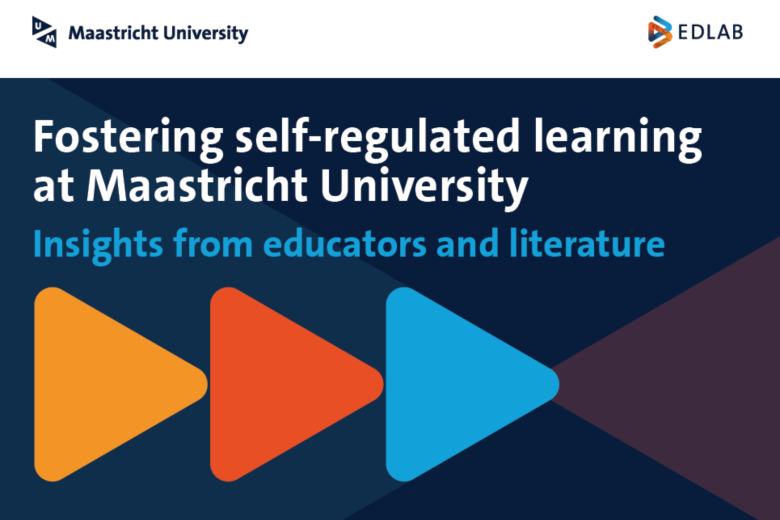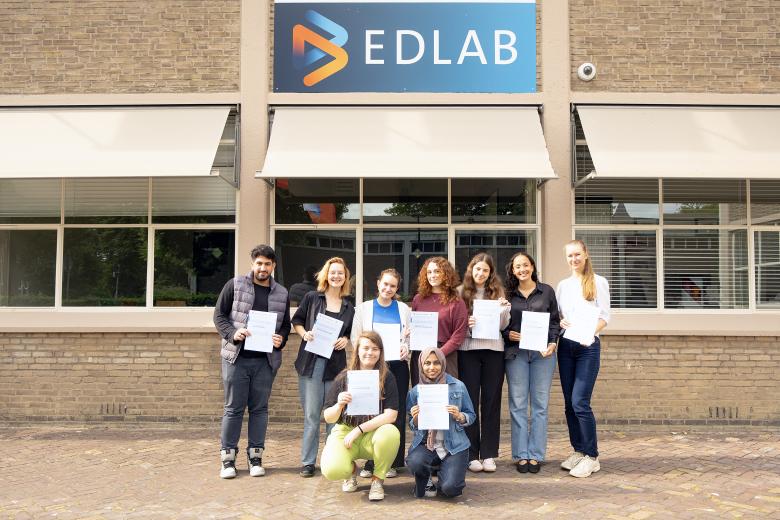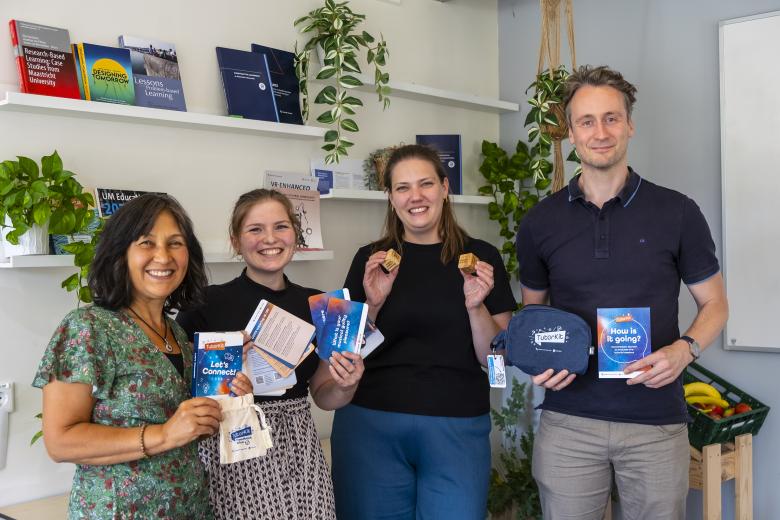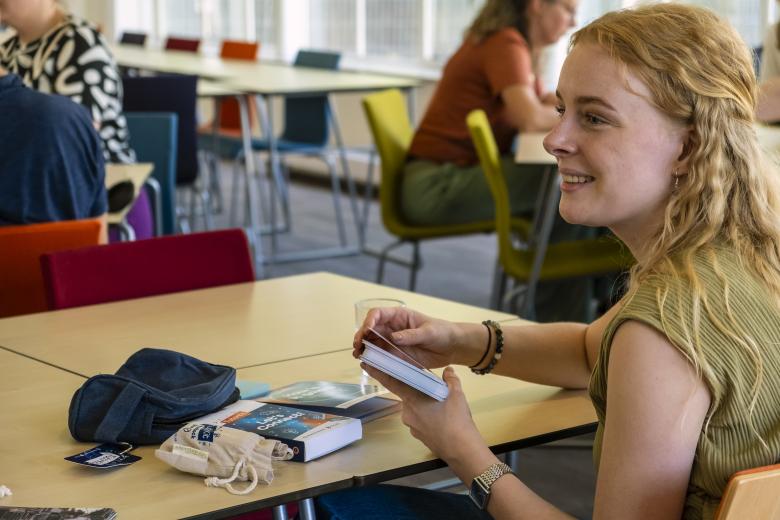Introducing the UM TutorKit
EDLAB has developed the UM TutorKit to provide quick and easy tools for common challenges in Problem-Based Learning (PBL) classrooms. From September 2024, this new toolkit, which supports group dynamics, feedback, and evaluation processes, will be available to all UM teachers across faculties.
Supporting tutors
The TutorKit was created in response to two frequent requests from educators: the need for a practical toolkit to support PBL teaching, and the desire to mass-produce popular tools like feedback cubes and icebreaker card decks. Each TutorKit is compact, about the size of a small toiletry bag, and contains various playful items for group dynamics, feedback, and evaluation, as well as support cards, markers, sticky notes, and basic instructions.
Suitable for all learning contexts
The items in the TutorKit are designed for various learning environments at UM, not just 7-step PBL or standard classroom settings. They are for any group or team learning activity. Each kit also includes a QR code linked to a feedback survey, inviting staff and students to share their experiences with the tools, their preferences, and any suggestions for improvement.
Even though it is a minor addition to standard classroom setups, the TutorKit could prove useful during critical moments in the PBL process, such as enhancing group dynamics, feedback provision or evaluation. EDLAB hopes its playful approach will contribute to enriching the PBL experience for both students and educators!
Positive reception from UM teachers
During a demo session at EDLAB on 22 August 2024, teaching staff responded enthusiastically, particularly to the kits' analogue nature. “I love the fact that the Let's Connect cards aren't digital and that you can hold them in your hands," said one participant. Another added, "I have always wanted something like this in the classroom. I even created my own cards for students, but these look so much better."
The kit was praised for its practicality: "I really see myself using the TutorKit in the classroom, especially the Let's Connect cards," said one participant. Another praised the evaluation notepad: "The evaluation sheets are so useful. I usually ask my students only one question: do you have any feedback about the course? But these sheets are more precise and cover all the main aspects in just five questions."
Other tutors appreciated how the kit addresses specific challenges: "There is never enough time for evaluation, and it often ends up not happening properly. The evaluation sheets encourage you to take the time to evaluate in a straightforward, effective way."
Tutors valued the flexibility of the kit, with comments like, "The TutorKit allows you to try out new things in the classroom" and "Everything looks sturdy and of good quality." Even small details, like the whiteboard markers, were met with enthusiasm.
TutorKit photo gallery
Have you used the toolkit? We look forward to hearing about your experience!
The development journey of the TutorKit
Walter Jansen explained the inspiration behind the TutorKit: "The idea was sparked by a question from one of our faculty liaisons when EDLAB was first established: 'Could we create something like a first aid kit to help tutors manage classroom dynamics, evaluation, and feedback?' This request stayed in our minds while we worked on other projects.
One such project, the Feedback Cubes, was developed by a student team within PREMIUM and was well received for handling conflict situations and gathering feedback. However, the cubes' initial paper and cardboard structure limited their durability and distribution. Later, the Faculty of Psychology and Neuroscience (FPN) created the Curious Minds card deck, which became widely popular. "Everyone loved it," said Walter. "Other faculties found it to be a more engaging and diverse icebreaker than what they had used before."
Based on this feedback, an EDLAB team developed a toolkit for tutors combining popular and needed elements. Over the past year, we worked to design these tools and find a company to produce them, which proved to be more challenging than expected. However, we successfully began distributing the kits to all UM faculties last week.”
Green facts
The Feedback Cubes were produced by UM colleague Burak Can (SBE) who, in collaboration with the entrepreneurial community of Qeske Maastricht , oversaw the entire production process, from ordering and cutting the wood to laser printing the text, sanding, and air compressing the cubes. The EDLAB team also assisted with sanding and oiling the cubes to give them a polished finish. The TutorKit bag itself is made from recycled plastic bottles.
Where to collect your TutorKit
Each faculty will distribute the TutorKits according to their own systems. Some will hand them out directly, while others will store them for collection. An online version of the TutorKit is also available on Canvas, with printable versions of the tools like the Feedback Cubes, complete with templates.
Where can I find a TutorKit in my faculty?
- FASoS: Front Office at GG90-92, contact: Mirko Reithler
- FHML: UNS60, N4.22, contact: doc-prof-fhml@maastrichtuniversity.nl
- FPN: UNS40, A1.767, Bureau Onderwijs, contact: Wladimir van Mansum
- FSE: Education Support Office, contact: Lonneke Bevers
- LAW: BOU, B0.106, Onderwijsbalie, contact: Elly Peters, Catherine de Rijdt, Jennifer Sellin
- SBE: TS53, each department has TutorKits available, contact: your department mentor
Also read
-
Research report: Fostering self-regulated learning at Maastricht University – Insights from educators and literature
Drawing on academic literature, good practices, and the experiences of UM teaching staff, this handbook outlines what SRL is, how it connects to our CCCS educational model, and how it can be applied in day-to-day teaching. It includes concrete examples, tools, and reflections from colleagues across...

-
ESAB students receive certificates for their contributions in 2025
In the academic year 2024-2025, 11 UM students joined the EDLAB Student Advisory Board (ESAB) and contributed their ideas to cross-faculty discussions on teaching, learning, and educational innovation.

-
More than another ‘to-do’: how the UTQ helped me rethink my teaching
At Maastricht University, the University Teaching Qualification (UTQ) is a professional development programme designed to strengthen teaching and learning. It supports teachers in developing core teaching competencies through a combination of workshops, peer learning, on-the-job experience, and...













